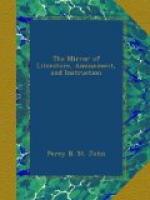To the curious among the perusers of the Mirror, it may not be uninteresting to know that a beautiful impression may be taken on paper of the reticulated web of the field-spider, by sprinkling it finely with any dark-coloured liquid, and placing the paper intended for the impression behind the web, and drawing it gently towards you. I do not know of what ingredients bookbinders’ blue-sprinkle is made, but it seems to absorb the gelatinous matter of which the web is composed. The idea that an impression might be produced in this manner, was suggested to me by observing the dew on the web in the morning.
Rugby. W.I.T.
Our ingenious Correspondent has, on the fly-leaf of his letter, furnished us with the impression of a web, as a proof of the practicability of the above.
* * * * *
ATAR GUL.
(For the Mirror.)
Who hath not inhaled with ecstasy the delicious, the heavenly odour of “the Atar Gul, more precious than gold?” Who hath not in fancy wandered, as he inspired it, to the terrestrial paradise from whence it is procured? And who that knew not how so volatile an essence was collected, hath not marvelled, over the enjoyment of Otto of Roses? Persia, Turkey, and Egypt, are the principal countries in which it is manufactured, and the Atar of Persia is generally allowed to be the most superior, and the most difficult to be obtained genuine. The rose of Cashmire is proverbial throughout the east for its brilliancy and fragrance; and “the Roses of the Jinan Nile, or Garden of the Nile, (attached to the Emperor of Morocco’s palace) are unequalled; mattresses are made of their leaves for the men of rank to recline upon.” I transcribe from a published account in my possession, the method of obtaining Atar Gul in the east (for I have heard that some English chemists have endeavoured to procure it from English roses.) merely begging to observe that it exactly corresponds with that given to me by a gentleman who had witnessed the process in Egypt.
“Otto of Roses.—The usual method of making it is, to gather the roses with their calyces, and put them into a still with nearly double their weight of pure spring water; which, when sufficiently distilled, will be highly scented with roses; this is then poured into shallow vessels and exposed to the nocturnal air. Next morning, the Atar, or essential oil of the flowers is found swimming in small congealed particles on the surface of the water; it is carefully collected and preserved in small glass bottles."[1] A hundred pounds of the flowers scarcely afford in India two drachms of essential oil. “Cent livres de petales de Roses,” says a French chemist, “N’en fournissent par la distillation que quatre drachmes.” Tachenius from the same quantity obtained half an ounce, and Hoffman a much larger proportion. The




